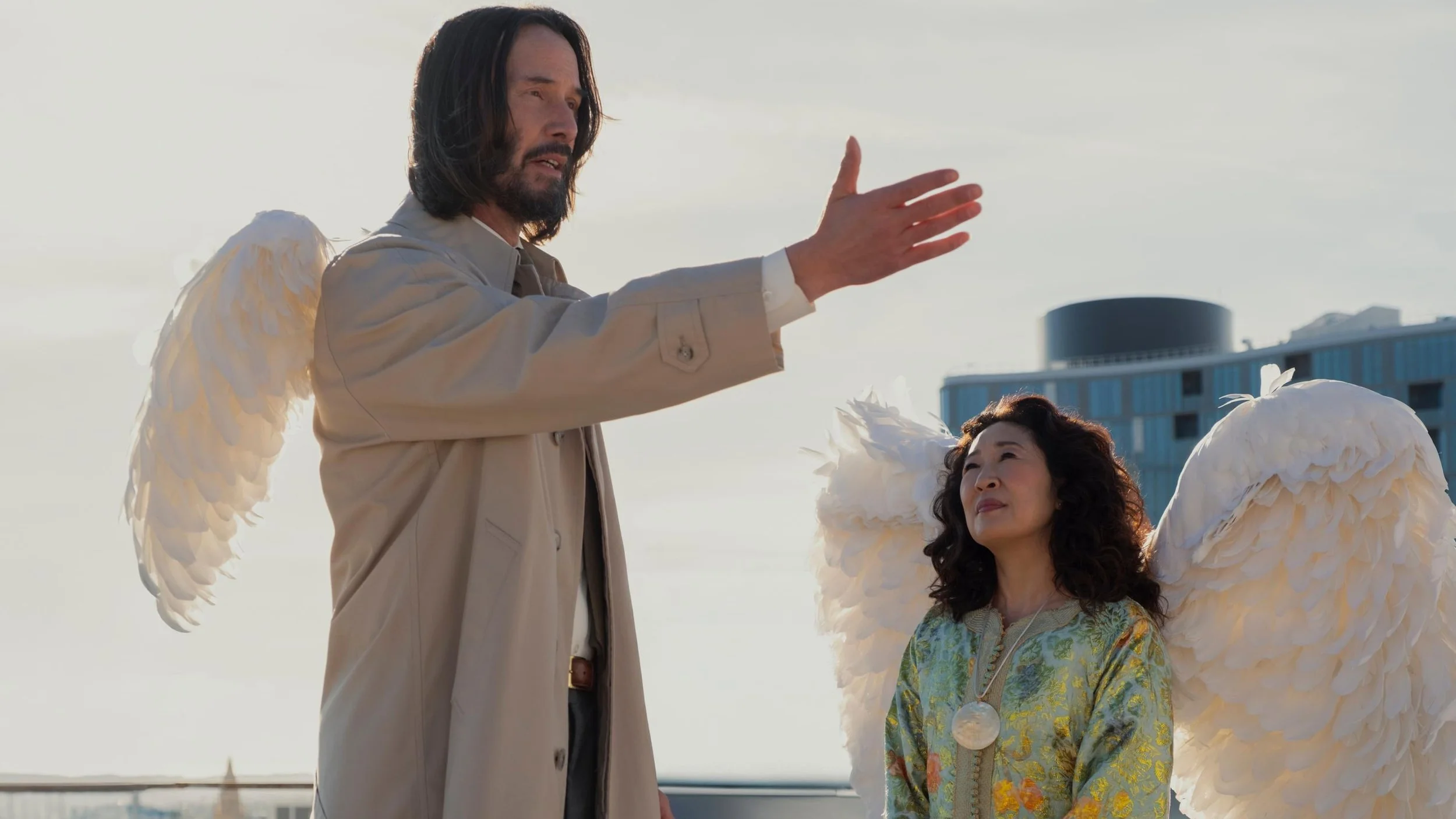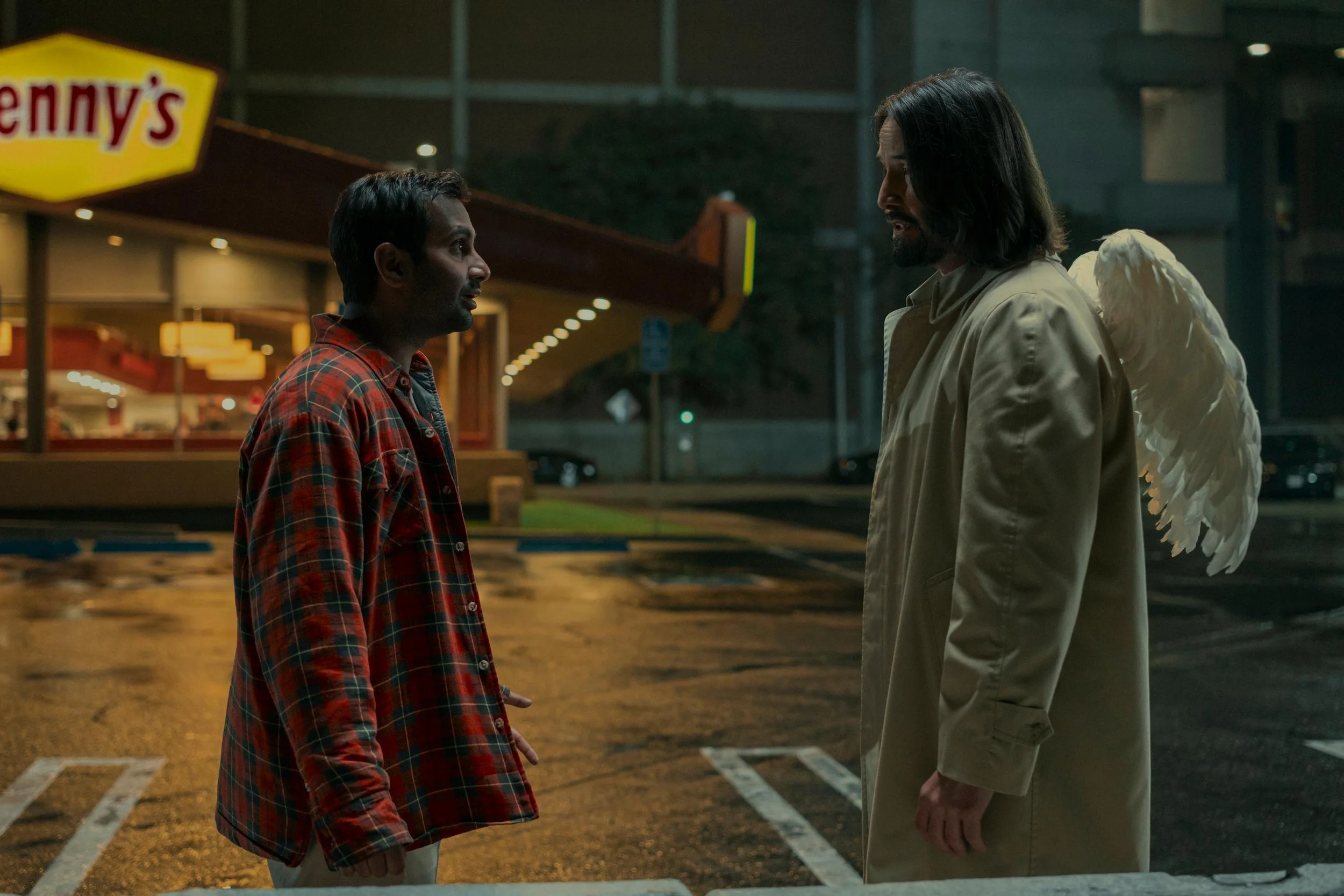Small Wings, Smaller Ambitions: Good Fortune Falls Flat
Fresh off another round of criticism for performing in the Riyadh Comedy Festival, Aziz Ansari continues to struggle with negative public reactions to private moments, which famously caused Netflix to move him into a behind the scenes role for his acclaimed series Master of None for its third season. So here we are with a new comeback project, the feature film Good Fortune, which he wrote, directed, and stars in. And how did he do? To put it lightly, not great. Mostly because Good Fortune liberally borrows from several older, better movies in an attempt to tell a story about modern working class struggles. And with a comedic tone and a political message that both felt surface level at best, I was left hoping for a tastier fortune cookie next time.
This might be the first movie by Ansari to be released in theaters, but it isn’t the first film he directed. His previous project, Being Mortal, was never released because production was shut down 75 percent of the way through principal photography due to misconduct allegations against featured player Bill Murray. It’s worth mentioning this when assessing the merits of Good Fortune since Ansari tightly controlled the creative details of this project as writer and director, casting himself as an unlucky person just trying his best in a broken world—seemingly indicating how he sees himself at this moment in time, although his reality as a famous person battling bad press is far different from his working-class character.
First seen atop Griffith Observatory watching over Los Angeles, Keanu Reeves plays an angel named Gabriel who behaves just like the guardians in Wim Wenders’ sumptuous fantasy Wings of Desire. Only Gabriel serves a somewhat less than stellar role: he’s meant to guide wayward individuals from texting-while-driving accidents. Unfortunately whatever humor could be mined from this junior guardian assignment is weirdly played down in the brief montage of humans we see Gabriel redirect from a driving accident. Instead, Good Fortune never quite wants us to forget that Keanu Reeves signed up for this part and agreed to partake in a number of increasingly silly scenes. And while I do wish that this kind of casting gimmick had been implemented in a more interesting movie, it is admittedly the best part about this one. But more on that later.
Gabriel quickly meets Arj, played by Ansari himself, a bitter man living out of his car who’s forced to take on thankless jobs via a Task Rabbit-type app. When hired to help clean out the garage of a wealthy tech bro named Jeff (Seth Rogen, who elevates every scene he’s in), Arj senses an opportunity and pitches himself as Jeff’s new assistant. To his surprise, Jeff agrees.
What follows is quite plot heavy, often to the detriment of the story the film is trying to tell. When Arj uses Jeff’s company card to treat his work crush Elena (Keke Palmer in another well-cast performance), Arj is quickly fired and then loses his car for negligently not paying parking tickets accrued from his task rabbit job.
From Gabriel’s perspective, Arj’s circumstances make him a potential candidate for a lost soul that he can save and spur his move to bigger and better assignments. Gabriel decides to interrupt Arj’s downward spiral, causing the movie to become a modern take on Trading Places, with a dash of How to Succeed in Business Without Really Trying thrown in for some reason. Via some heavenly magic, Arj and Jeff switch places, which allows Ansari to step into the kind of cocky and confident humor he excelled at as Tom Haverford on Parks and Rec.
But this element proves frustrating after a while. Without any real clarity on the rules of this arrangement, which come across as arbitrary and nonsensical, humans and angels alike watch unplanned tragedies unfold as a result of the swap until Arj chooses to return to his own life. Sandra Oh, who was seemingly only available for two days of filming, brings her signature warmth and wisdom to the brief moments when her character Martha, a manager angel of sorts, attempts to guide Gabriel towards his own higher calling. But Martha only appears intermittently and it’s hard to tell if the story belongs to Gabriel, Jeff or Arj.
A series of even more convoluted plot points follow, which see Arj using his newfound wealth to win over Elena and enjoy the perks of the one percent. This is where Good Fortune’s social and class commentary gets a little muddled. Ansari wants us to both relate to Arj’s blind acceptance of his privileged existence and also judge him for not caring how he’s actively harming Jeff, who’s forced to knowingly navigate the hardship of Arj’s life as though it is his own. Through Elena’s eyes, we also see Arj in a new light and understand why she chooses to prioritize unionizing the big box store she works at over going on a trip to Paris with Arj, though for some reason Arj continues to cling onto the comfortable, but hollow, new life he’s been able to enjoy.
It’s this level of commentary, which could be gleaned from one Atlantic article about the harm executives are extracting from hourly and gig workers in America right now, that proved frustrating to see unfold without much nuance. Arj gives Jeff’s money to his dad and helps get an unhoused friend on a path to a better life, but doesn’t do much to impact the world beyond his immediate network. Which left me wondering why Ansari didn’t borrow plot points from another life swap movie and allow Arj to become the hero of his own journey by implementing sweeping improvements at Jeff’s company. Instead, this decision falls to Jeff once the swap is reversed.
It’s at this point that the best part of the movie finally emerges: an unexpected buddy dynamic between Jeff and Gabriel as the two down-on-their-luck men try to work their way back to their golden lives. Seeing Keanu Reeves banter with Seth Rogen while dressed as a chain-smoking dish washer had the theater erupting in the loudest laughter of the film. Personally, a throwaway shot of Rogen sneaking a bit of a tasty looking cheeseburger while rummaging through his own house delighted me to no end. For many reasons, I wish that this has been the main focus of the film.
Overall, I can’t say that I particularly enjoyed Good Fortune. The humor wasn’t consistent throughout, little was done to evolve upon the films it drew influence from, and I don’t think Ansari did a good job of directing himself. There were also some challenging storytelling decisions that felt like convenient plot points to get actors to play to their strengths.
Yet it was interesting to see how the current iteration of Hollywood might comment on the popular conversations of labor imbalances in the world. If the humor had been sharper around Arj’s surprising pivot into complete selfishness, or the political commentary had been more clearcut around why no one would willingly give up personal comfort for the betterment of someone else, Good Fortune could’ve made for a more compelling viewing experience. Instead, we’re both for and against all of our male leads.
But the chemistry between the four leads was charming enough to keep me in my seat. All four actors are likeable enough performers who reminded me throughout why all of them are stars and made me wish they had better material to breathe life into. Perhaps Ansari’s next film will give them that opportunity.
If you enjoyed this article, please consider becoming a patron of Hyperreal Film Journal for as low as $3 a month!



Mase Kerwick is a filmmaker, performer and Best of Austin nominated host of the podcast Queertowne.